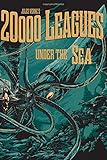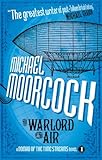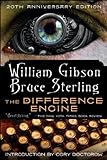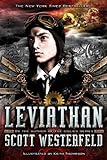When you hear the word steampunk, it probably conjures up visions of tight corsets, thick goggles, top hats, and intricate costumes involving clockwork and other machinery. Everyone is dressed in lace and waistcoats, but they wield strange technologies — prosthetic-like accessories that give them the curious appearance of Victorian cyborgs. Indeed, the “steampunk” aesthetic is characterized by a mind-boggling mashup of future and past.
Steampunk as a fashion trend emerged full-steam (pardon our pun) in the 90s and early 2000s, and has only become more popular — and imaginatively manifested — since then. It’s even been described as a “subculture,” encompassing not just fashion, but all sorts of DIY projects such as custom furniture, as well as mainstream media like TV and movies. Notable in the steampunk repertoire are films like The League of Extraordinary Gentlemen and Disney’s Treasure Planet, which combine classic action/adventure tropes with inventive science fiction to create spellbinding stories in universes very unlike our own.
So what is steampunk as a literary genre? To put it in a more bookish context, steampunk is the eccentric lovechild of Victorian literature and cyberpunk, the latter of which is itself a combination of “lowlife and high-tech” (think The Matrix or Blade Runner). However, rather than homing in on a hypothetical future, steampunk projects its speculation back into the past — reimagining the 19th century with technology far exceeding the reality of the era. Naturally, steampunk literature focuses less on pure aesthetics and more on story, which has resulted in some of the most exciting speculative fiction in the canon.
As a subgenre of sci-fi, steampunk is sometimes guided by certain rules of scientific possibility, yet it also tends to incorporate fantasy elements like mythical creatures and time travel. It’s definitely a bit slippery — one of those genres you have to read to truly understand.
But we all know there’s no time like the present (as ironic as that is to say about this particular genre). So here are 25 iconic steampunk novels from the past 150 years, sure to enthrall fans of alternative timelines, steam-powered madmen, and ruthless political allegories alike.
Looking for something new to read?
Trust real people, not robots, to give you book recommendations.
Or sign up with an email address

1. Twenty Thousand Leagues Under the Sea by Jules Verne (1870)
Widely acknowledged as one of the original architects of steampunk, Jules Verne doesn’t peer into the past with Twenty Thousand Leagues Under the Sea, but at his own present; this book was published smack-dab in the middle of the Victorian era. This sublime seafaring tale follows marine biologist Pierre Aronnax as he’s swept up in a whirlwind adventure aboard a high-tech submarine called the Nautilus. Spearheading their expedition is the mysterious Captain Nemo, who has no desire to ever return to shore… and won’t let any of his crew leave, either. Though Aronnax enjoys the exciting underwater destinations and discoveries, he can’t help but wonder about Nemo’s motivations, which are as murky as the darkest depths of the ocean — and possibly even more sinister.

2. The Time Machine by H.G. Wells (1895)
Another seminal work of steampunk was H.G. Wells’ book, The Time Machine. This novella is significant not just to steampunk, but to science fiction as a whole: it introduced and popularized the idea of time travel through a “time machine,” a term that Wells invented himself. Of course, his protagonist — referred to only as “the Time Traveller” — is even more groundbreaking than the book: the story kicks off with him traveling over 800,000 years into the future. He finds that humanity has evolved into two separate species: the small, elegant Eloi and the caveman-like Morlocks. However, the Traveller’s theory about their relationship could not be more wrong, as a chilling series of encounters reveals what has really happened to society and where it now stands.

3. Warlord of the Air by Michael Moorcock (1971)
There was a long dry spell in the world of literary steampunk after The Time Machine, as the Victorian era ended and most people lost interest in the possibilities of advanced steam power. That lasted until the 1960s and 70s, when the genre suddenly became something new: a combination of retrospective and predictive, or “retrospeculative,” if you will. Warlord of the Air was one of the early books of this “new” steampunk, drawing up an alternate timeline in which World War I never happened and an un-bankrupted Britain retained power over all its colonies. Our hero, Oswald Bastable, hails from the 19th century but has been transported through time to 1973. He discovers in London a modern utopia full of new-age technology. But when Bastable realizes that the price of this “utopia” has been the mass oppression of the colonies, he turns against his own country to fight for the underdogs suffering at its hands.

4. Morlock Night by K.W. Jeter (1979)
Jeter was one of the first writers to actually use the term “steampunk” to describe his book — which, as you may gather from the title, was inspired by the events of The Time Machine. Morlock Night revolves around those brutish beasts sprung from H.G. Wells’ imagination, daring to address a question that Wells himself never did: what would happen if the Morlocks managed to get ahold of the time machine and transported themselves back to Victorian England? According to Jeter, the result would be nothing short of pandemonium, necessitating the involvement of King Arthur himself (yes, you read that right) to stop the Morlocks from carrying out their nefarious plans. Though it’s not a particularly “serious” sequel, Morlock Night remains a landmark of steampunk and a rollicking fun adventure, especially for those new to the genre.

5. The Anubis Gates by Tim Powers (1983)
The Anubis Gates puts an ancient Egyptian twist on steampunk in this mystical novel, which posits another alternate timeline stemming (albeit indirectly) from British imperialism. In a desperate attempt to repel their oppressors, a group of Egyptian magicians (say that ten times fast) summons the god Anubis. However, in the process, they rip a hole in the space-time continuum, creating the titular “Anubis Gates.” Decades later, Professor Brendan Doyle goes through the gates back to 1810 to attend a lecture by Samuel Coleridge… but the visit turns disastrous when Doyle is kidnapped and prevented from returning to his own time. Now he must determine his destiny in this new-old era, all the while evading the magical, murderous threats that seem to loom around every corner.

6. Homunculus by James Blaylock (1986)
Like Morlock Night, Blaylock’s Homunculus is a somewhat tongue-in-cheek take on steampunk. It begins with an airship piloted by a skeleton, which has been orbiting Victorian London for several years, and which spurs a peculiar collection of characters — among them a scientist, an evangelist, and an evil millionaire — into trying to steal it. Their motivations are myriad and absurd, ranging from one character’s belief that his father is a tiny alien aboard the ship, to another’s conviction that this “homunculus” can raise the dead. The book culminates in an action-packed and completely ridiculous collision of characters in the hills of Hampstead Heath, where the airship finally comes down and sparks a riot.

7. The Difference Engine by William Gibson and Bruce Sterling (1990)
A highly elaborate alternative history features in The Difference Engine, which diverges from our own timeline after Charles Babbage invents the first analytical computer in 1824 (a feat he attempted in real life, but was unable to complete). This means that the Industrial Revolution and the computer age happen concurrently, impacting the world in massive ways. However, the book chooses to focus on a few individuals rather than international consequences of this wild acceleration, with its main characters being linked by a mystery surrounding the “punch cards” used for computer programming. Between the rigorous detail and compelling characterization, The Difference Engine will please fans of historical fiction and fantasy alike, and is another great (though definitely dense) introduction to steampunk.

8. The Diamond Age by Neal Stephenson (1995)
From the author of several influential works of cyberpunk comes The Diamond Age, in which the world has evolved based on highly advanced nanotechnology. Society and government as we know it are obsolete — replaced by “phyles,” which are essentially nation-states upheld by a common treaty, and which work together in harmony with their fellow phyles. Our protagonist, Nell, is a “thete”: a lower-class non-member of the phyles who’s destined to lead an impoverished and unhappy life. But when she comes to possess a rebellion-championing guide that teaches her science, history, martial arts, and more, Nell sets off on a journey that changes not just her own life, but the entire Diamond Age.

9. Jack Faust by Michael Swanwick (1997)
Whether or not you’ve read other versions of his tragic tale, Swanwick’s steampunk-inspired take on Faust — the man who sold his soul to the devil in exchange for boundless knowledge, power, and pleasure — has implications that will shake you to your core. Here, Jack Faust is a disillusioned doctor and alchemist who’s burnt his books and begun contemplating suicide. Suddenly, an enigmatic being appears before him and offers all the answers he so desperately seeks. What seems to Faust like a wondrous miracle eventually reveals itself to be anything but, as his knowledge fosters scientific and mechanical advancements long before they were meant to occur, wreaking havoc on a world that isn’t ready for them.

10. Perdido Street Station by China Miéville (2000)
A quickly cemented classic in the subgenre of new weird fantasy, Perdido Street Station combines steam-powered technology with dark magic in a city where corruption reigns and strange mutant creatures roam. The story commences with a covert deal between a birdlike man, Yagharek, and a scientist named Isaac, who promises to restore the former’s mutilated wings. But in the process of gathering specimens to work from, Isaac accidentally unleashes a monster (dubbed a “slakemoth”) that paralyzes people and feasts on the minds of its victims. After Isaac’s slakemoth frees its siblings being held in captivity by a mob boss — who’s been harvesting their hallucinogenic milk to peddle as drugs — the creatures begin terrorizing the city. Isaac and company must find a way to stop them without succumbing to the monsters or the brutal police state trying to cover up their existence in this brazenly bizarre and horrific novel.

11. Mortal Engines by Philip Reeve (2001)
The fantastically powerful engines of Mortal Engines are not merely located within cities; they’ve become part of them. “Municipal Darwinism” has emerged as a result, with the biggest, strongest cities traveling on wheels and consuming their weaker counterparts for resources and energy, forming a chilling urban food chain (and an apt metaphor for colonialism). This is the world in which Tom Natsworthy has grown up, ultimately becoming a teenage apprentice to the London “Historians,” a guild charged with ensuring its prized artifacts remain safe. But after a chance encounter with the Head of Historians and a rebel girl named Hester, who claims the Head killed her parents, Tom must re-examine all he thought he knew. Soon he and Hester are expelled from the ever-transient London, and must use all their wit and grit to get back “onboard” — and to save the city from itself.

12. Airborn by Kenneth Oppel (2004)
An incredible feat of young adult speculative fiction, Airborn depicts the life of a young cabin boy named Matt aboard the airship Aurora, kept aloft by a lighter-than-air gas called “hydrium.” The course of this life changes drastically when he meets a spirited young scientist named Kate, who wishes to prove the existence of flying panther-like creatures discovered by her grandfather — a man whom Matt knew just before he died. When the Aurora is raided by pirates and crash-lands on a mysterious island, Matt and Kate seize the opportunity to search for the elusive “cloud cats.” Little do they know what awaits them….

13. Against the Day by Thomas Pynchon (2006)
This more-than-thousand-page novel — Pynchon’s longest work to date — inherently defies synopsis, but we’ll try to give you a taste of it anyway. Against the Day covers a period of time from the 1893 Chicago’s World Fair to just before World War I, spanning multiple continents and more than 100 characters. The most cohesive central thread involves an anarchist named Webb Traverse, who’s assassinated for his anti-business sentiments and dynamite schemes. His three sons then vow to avenge their father, and spend much of the book’s “episodes” carrying out this somehow endlessly complicated mission.
However, the plot of Against the Day is not meant to be its focal point — even the most stalwart reader would do well not to worry about it too much. Pynchon’s astute homages to various works of steampunk, his Dostoyevskian use of mirrors and doubles, and the characters’ farcical and often hilariously meta actions are all much more intriguing than the narrative itself. So if you do attempt Against the Day, remember that it’s okay not to see the forest for the trees until the very end (if indeed at all).

14. Boneshaker by Cherie Priest (2009)
With one of the most original steampunk premises in recent memory, Cherie Priest’s Boneshaker infuses the genre’s typical scientific speculation with the thrill of a zombie apocalypse. The titular “Boneshaker,” an extremely powerful drill, sets this tale in motion by drilling into the subterranean depths of 19th-century Seattle — releasing a poisonous gas that kills hundreds and turns corpses into “rotters,” or flesh-eating zombies. Years later, a protective wall has been built around the breach, and the inventor of the Boneshaker has vanished, leaving behind a wife and son — Briar and Zeke — who struggle to overcome their reputation. That is, until Zeke resolves to prove his father’s innocence, venturing back into the perilous ruins of Seattle… with his mother, who harbors a dark secret, close behind.

15. Leviathan by Scott Westerfeld (2009)
Those who grew up reading Westerfeld’s dystopian Uglies series will find their steampunk fix in Leviathan, another WWI-based alternative history. The story begins with the son of Archduke Franz Ferdinand, Aleksander, fleeing his own traitorous empire. Parallel to this, an English girl named Deryn dreams of joining the British Air Service to work on ships like the Leviathan, an enormous airship and Britain’s greatest weapon in the war. Alek’s and Deryn’s fates collide when Alek witnesses the Leviathan crash into a glacier (in a rather Titanic-esque spectacle) and saves Deryn (who’s masquerading as a boy, Mulan-style), risking his own capture in the process. The two young fighters soon bond over their secrets and shared desire to emerge victorious, just before an unexpected weapon changes everything.

16. Soulless by Gail Carriger (2009)
Alexia Tarabotti is one hell of a heroine in Soulless, the razor-sharp paranormal romance debut from Gail Carriger. She may be a spinster, with parentage that makes finding a husband virtually impossible, but she’s also highly skilled in the art of “parasol combat” and perfectly capable of fending for herself. Oh, and did we mention she’s soulless — which means she can negate others’ supernatural powers with the barest touch? This unique talent has consequences for Alexia, however, after she accidentally kills a vampire, and Queen Victoria sends a werewolf investigator to sniff her out (no pun intended). Alexia knows she has nothing to do with the mass vampire disappearances in London high society. But will she be able to convince investigator Lord Conall Maccon of the same… while also grappling with her feelings for him?

17. Retribution Falls by Chris Wooding (2009)
The first book in Wooding’s Tales of the Ketty Jay series, Retribution Falls introduces us to rogue captain Darian Frey and his crew on the airship Ketty Jay. At first, these characters are concerned with little other than making money through various illicit schemes, flying under the radar because they rarely cause any real trouble. But when Frey and his gang are blamed for blowing up a cargo freighter full of valuables, they can no longer operate in the shadows. Suddenly, the whole Coalition Navy is scouring the skies for the pirates, and Frey must use every ounce of gumption he has to escape them and uncover the true culprit behind the explosion (with plenty of exhilarating stratospheric fight scenes along the way).

18. Terminal World by Alastair Reynolds (2010)
Reynolds’ Terminal World is landmarked by a colossal Dark Tower-esque spire, Spearpoint, housing more than thirty million people on six stratified levels. Beyond Spearpoint is the “Outzone,” where drug-addled land pirates (Skullboys) and brain-eating cyber-canines (Carnivorgs) roam free. Needless to say, not the cheeriest of places… but it’s into these badlands that pathologist Quillon must venture, after an angel fallen from Spearpoint’s highest zone warns him of what’s to come. What follows is a remarkable “steam opera” in which Quillon and his guide, Meroka, battle the aforementioned Skullboys, Canivorgs, and countless other threats as they try to abscond to safety. However, even once they’re taken aboard a Skullboy-fighting airship, their journey is far from over: they soon discover the true origins of Spearpoint, and revelations about the zonal boundaries that have kept its citizens apart for so long.

19. Clockwork Angel by Cassandra Clare (2010)
Conceived as an elaborate prequel to Clare’s blockbuster Mortal Instruments series, the Infernal Devices trilogy begins with the riveting Clockwork Angel. Our heroine, Tessa Gray, comes to Victorian London to meet her brother Nathaniel… only to find that he is missing. Tessa herself is immediately kidnapped by a pair of “Dark Sisters,” who train her to shapeshift and try to force her into marriage with a mysterious figure called “the Magister.” Luckily, Tessa is soon rescued by fellows of the Shadowhunter Institute in London. After realizing the extent of her powers, along with the malevolent machinations of the Magister, Tessa’s swept up in a dramatic battle of good vs. evil involving vampires, demons, clockwork-human hybrids, and more — all the while searching for her lost brother (who may or may not be aligned with the Magister himself).

20. Burton and Swinburne by Mark Hodder (2010)
Hodder’s brilliantly imagined Burton and Swinburne series — starring none other than the real historical figures of Richard Francis Burton and Algernon Charles Swinburne — kicks off with The Strange Affair of Spring-Heeled Jack. In this particular universe, it’s only 1861, but Darwin has already quashed religion, and societal focus is on industry and technological advancement. However, this enlightenment hasn’t stopped sightings of “Spring-Heeled Jack” — a spirit witnessed by King Albert himself, who hires Burton and Swinburne to investigate the situation. Our sharp-witted detectives soon make a connection between Jack and other supernatural occurrences in London… eventually stumbling upon the shocking truth about the supposed specter. Readers will also enjoy cheeky cameos from the likes of Florence Nightingale and Oscar Wilde, who manifest rather differently than the historical versions of themselves.

21. The Half-Made World by Felix Gilman (2010)
The Half-Made World features a Wild West-inspired, war-torn land now divided into two factions: the Line, backed by high-tech weapons and railways, and the Gun, who rely on fear and violence to control people. Fighting has raged between them for decades, and the secret to ending it is allegedly trapped in the mind of a mad old General. This is where our leads come in: psychologist Liv Alverhuysen and Gun agent John Creedmoorcross paths when Liv attempts to cure the General of his madness — and Creedmoor kidnaps both the General and Liv so he can extract the war-winning secret. However, this proves difficult with Line forces hot on his heels, culminating in a showdown that would have Clint Eastwood shaking in his (cowboy) boots.

22. Lady of Devices by Shelley Adina (2011)
For a change of pace from all the mega-heavy life-and-death stuff, you might pick up Lady of Devices, which takes place in a fairly typical alternate Victorian era with advanced steam power. What’s unique here is the protagonist: seventeen-year-old Claire Trevelyan, who’s more book-smart than “ballroom-smart” and spends most of her time in the lab rather than trying to find a suitor. But when her family loses their estate, the resourceful Claire must use her talents as both a lady and an engineer to survive (and make a tidy profit) on the harsh streets of 19th-century London.

23. The Iron Duke by Meljean Brook (2012)
In The Iron Duke, after Rhys Trahaearn frees England from the subjugation of the “Horde” (which controlled people through nanotechnology), he becomes a hero and leader of his own empire, ruling with an iron fist — hence his nickname. Needless to say, he’s accustomed to getting his way… and when Inspector Mina Wentworth arrives to investigate a dead body that’s been dropped on his doorstep, Rhys decides that he must have her. However, Mina won’t be distracted (at least at first) — making clear to the Duke that this was no practical joke, but a clue to a grand conspiracy threatening his entire realm. Our dynamic duo must now venture out into dangerous lands beyond the empire so they can find the key to saving it — though they’re increasingly distracted by the smoldering chemistry between them.

24. Stoker and Holmes by Colleen Gleason (2013)
Another couple of otherwise incongruous figures are thrown together in Gleason’s Stoker and Holmes series: Bram Stoker’s sister Evaline and Sherlock Holmes’ niece Alvemina. (Just ignore the fact that Bram Stoker was indeed a real person, while Sherlock Holmes, not so much.) Their adventures ignite when a pair of London society girls vanish under seemingly supernatural circumstances, with only an odd Egyptian scarab left at the scene. Between Mina’s powers of deduction and Evaline’s vampire-hunting abilities, the Stoker-Holmes team is perfectly situated to take on the case. Only trouble is, their brains and brawn don’t always mesh; still, they’ll need to put aside their differences and work together, lest they become the next victims.

25. The Aeronaut’s Windlass by Jim Butcher (2015)
Capping off our epic list is The Aeronaut’s Windlass by Jim Butcher, of Dresden Files fame. Butcher’s steampunk is distinctly more whimsical than his urban fantasy, though there’s also a good dose of drama. The story starts with merchant ship captain Grimm joining a team of agents on a treacherous mission, in order to have his cherished ship, the Predator, repaired. But Grimm soon realizes that this is more than a simple barter, and that the conflict he’s involved in goes back far longer — and stems from a much darker place — than he ever could have imagined. Luckily, this rather weighty plot is tempered by a colorful cast of secondary characters (including a legion of talking cats), making Aeronaut’s Windlass a thoroughly entertaining and compulsively readable book for speculative fiction fans of all stripes.
**
Can't get enough? Here are a few more posts you might like:
